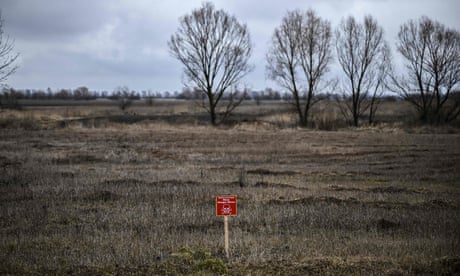- by foxnews
- 23 May 2025
Ukraine invasion may lead to worldwide food crisis, warns UN
Ukraine invasion may lead to worldwide food crisis, warns UN
- by theguardian
- 15 Mar 2022
- in news

The world is facing a potential food crisis, with soaring prices and millions in danger of severe hunger, as the war in Ukraine threatens supplies of key staple crops, the UN Food and Agriculture Organization has warned.
Maximo Torero, the chief economist at the FAO, said food prices were already high before Russia invaded Ukraine, owing to the effects of the Covid-19 pandemic. The additional strain of war could tip the global food system into disaster, he warned.
Wheat prices hit record highs in recent days, though they have fallen back slightly. Overall, food prices have been rising since the second half of 2020, according to the FAO, and reached an all-time high in February, after wheat and barley prices rose by nearly a third and rapeseed and sunflower oil by more than 60% during 2021. The price of urea, a key nitrogen fertiliser, has more than tripled in the past year, on rising energy prices.
At least 50 countries depend on Russia and Ukraine for 30% or more of their wheat supply, and many developing countries in northern Africa, Asia and the near east are among the most reliant.
Poor countries are bearing the brunt of the price increases. Many of the poorest countries were already struggling financially, with some facing debt crises, amid the pandemic.
The war in Ukraine presents multiple threats to food security that will be felt across the world, according to the FAO. Ukraine and Russia are major food exporters, so the war directly threatens supplies of staples such as wheat, maize and sunflower oil.
There is also the threat of countries closing their markets in response. The worst food price spikes in recent memory struck in 2007-08 and resumed in 2010-12, caused by high energy prices followed by poor weather. Those sudden peaks contributed to riots and political upheavals, the shocks of which are still being felt.
The agriculture ministers of the G7 group of richest countries met on Friday to coordinate a response, urging countries to keep markets open.
Torero urged countries to keep food systems open and to share information on stocks, harvests and food availability, to try to even out supply issues. Countries that were in a position to produce more should do so, he said.
Even if the conflict were to be resolved quickly, the impacts would be felt for some time, he said. The soaring price of fertiliser, for instance, will have a delayed impact, reducing yields for harvests still to come, as farmers start to use less of it now.
- by foxnews
- descember 09, 2016
United Airlines flight returns to Hawaii after concerning message found on bathroom mirror; FBI investigating
United Airlines Flight 1169 to Los Angeles returned to Hawaii after a "potential security concern" aboard the plane. The FBI and police are investigating.
read more


